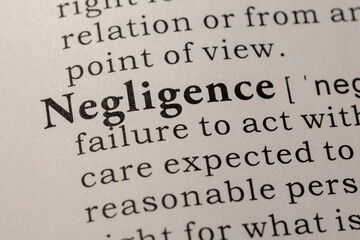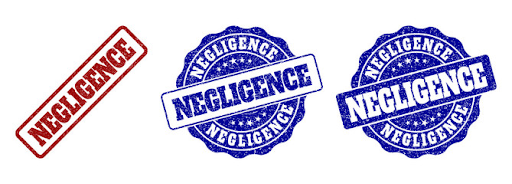How Is Negligence Determined in An Auto Accident?
How Is Negligence Determined in An Auto Accident Case?
Should you be involved in a car accident and the other person is at fault, you are entitled to compensation. It needs to be proven that the driver was reckless to show that the person was at fault. Recklessness suggests that the individual behaved in a manner that demonstrated disrespect for their obligation to drive safely on the road, culminating in you getting hurt.
In reality, most auto crash lawsuits are focused on negligence; no one is trying to trigger a car accident, after all. A fault lawsuit also includes a thorough review of the condition and conditions leading up to the crash. It must be established that while behind the wheel, the group at fault refused to comply with their duty of care.

The fundamental elements of an argument for negligence are:
- Duty of care
- Breach of duty of care
- The Causation
- Damages
You probably have a vague understanding of what these words entail unless you go to law school or work with an insurance firm. We break down each of these elements in this article to help you comprehend how they contribute to your argument.
Duty of care
In the rule, this underlying idea is a very relevant theory that applies to more than just traffic regulation. It implies that each person has a moral responsibility to conform to an acceptable standard of treatment and prevent actions or omissions that are likely to damage others.
Duty of care ensures that a registered driver has a fundamental moral requirement to conduct their motor vehicle in a manner that is not potentially dangerous to anyone or infrastructure, including other vehicles, riders, pedestrians, bicyclists. This is very easy: do not hurry, do not drive recklessly, observe road signs and traffic lights, use turn signals, etc. Traffic regulations are merely a form of communicating, or codifying, what moving safely entails.
Breach of Duty Care
Breach of duty of care implies a violation of the burden of responsibility noted above or the inability to follow it. The driver has broken the obligation they owe to others whenever a driver handles their car in a manner that may inflict damage to others or property.
The standard of “reasonable person” is used, i.e., what would a reasonable person have done in that situation? Did the driver convicted of negligence behave in such a way, or might a prudent individual have become more vigilant and behaved differently? If it is established that the driver has not acted in that manner, or if the driver has in any way broken traffic rules, it implies that the driver has been reckless.
When a breach of traffic rules or a summons from law enforcement was included in the violation of duties, these will go a long way to demonstrating incompetence.
The Causation
It is essential to prove in the breach of service, yet another aspect is involved. It must be proven that the violation of obligation directly triggered the injury or harm to their property by the complainant. This indicates that the crash would not have arisen had the driver been more vigilant. There must be a connection between actions and effects.
It is crucial to split down causation into two categories: cause-in-fact and proximate cause.
Cause-in-fact: Implies that the mistake was the direct cause of the violation of duty. For example, if a car would not brake for a red light and hit an automobile at the intersection with the right of way.
Proximate cause: Implies that the crash and injuries partially contributed to the violation of duty. If an intoxicated driver crashes into a power pole and falls on a vehicle, smashing it and maybe harming the passengers.

The Loss
In monetary quantities, the losses and expenses involved with the crash and injuries must be expressed. These are the defeats. Damages cover missed income, hospital bills, and building maintenance or reconstruction costs. The applicant must be able to convey losses in percentages, or the argument may be diminished or dismissed.
Damages come in two types as well: economic and non-economic.
Economic compensation: Precise sums of supporting evidence. The maintenance cost for your vehicle, hospital costs, and how much you lost in salary because of being out of work will be cases.
Non-economic harm: Psychiatric distress, for instance, or the all-encompassing “death and misery.”
Some instances of wrongdoing on the path that may contribute to the complainant being paid liability are as follows:
- Failure to comply with traffic laws: warning signals or warning lights operating, failure to comply with speed limits, talking while driving (illegal in individual states), and driving too slowly both count as an infringement of treatment.
- Failure to retain alertness: This is part of care; drivers must remain alert to react appropriately to unusual incidents or road conditions. Distracted driving induced by mobile phones’ usage while driving is becoming more and more regular, even if not criminal, and may be deemed a lack of care.
- Failure to retain vehicle power: Some examples include abrupt stopping or direction shifts, swerving, or losing control due to excessive pace.
- Failure to repair or correctly utilize the vehicle’s equipment: faulty headlights and poor braking may lead to accidents. Examples of not appropriately operating the vehicle’s facilities are failing to use turn signals or dim high beams.
Fault Shared

It is determined, in certain circumstances, that both drivers were partly at fault. Insurance agencies also represent this as a percentage for calculating the payment of losses. An injured driver-claimant can receive little or no damages if it is concluded that they were at fault or partly at fault, which is recognized as a comparative fault under Florida law.
No-Fault Rule
This is a word used for insurance, implying the victims of injuries are entitled to reimburse financial damages from their insurance provider, instead of who is liable for covering their hospital expenses. And where a severe injury has happened beyond a fair degree of medical likelihood, if there has been substantial permanent scarring and or someone has died, may a complaint be brought. This is according to section 627.727 of the Florida code.
Get Started Today
Our seasoned auto crash attorneys in Florida are committed to helping you build a workable legal plan to challenge these defences efficiently and obtain fair compensation for your injury. Please contact Boca Law Lawyers for a free appointment if you or someone you love has been involved in an automobile accident.
